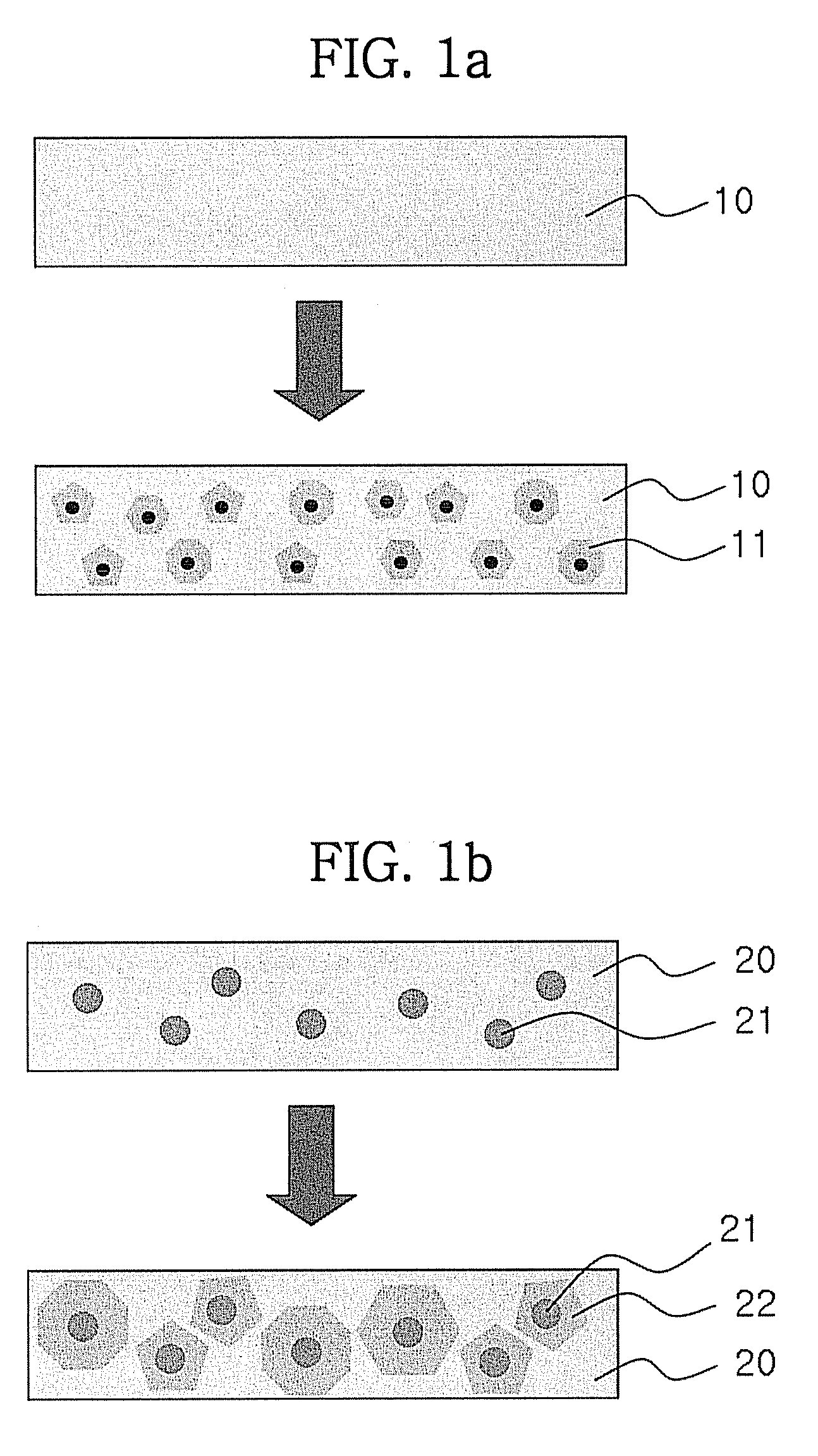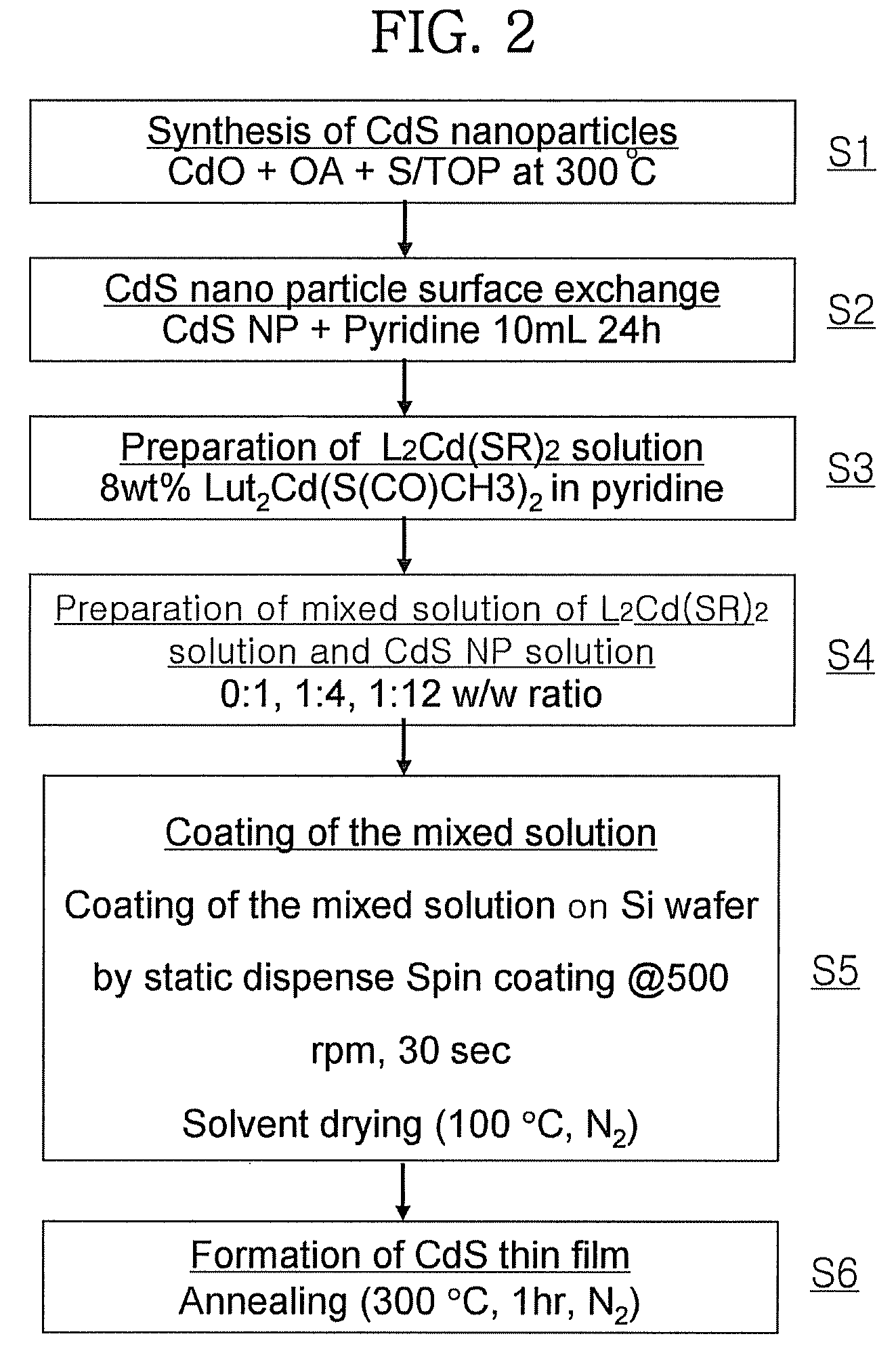Thin film containing nanocrystal particles and method for preparing the same
a nanocrystal particle and nanocrystal technology, applied in the field of thin film containing nanocrystal particles and a method for preparing the same, can solve the problems of low deposition speed, non-uniform surface state of the thin film prepared thereby, and applicability to processing, so as to improve the crystallinity of the thin film and reduce grain boundaries
- Summary
- Abstract
- Description
- Claims
- Application Information
AI Technical Summary
Benefits of technology
Problems solved by technology
Method used
Image
Examples
example 1
Preparation of CdS Nanoparticles
[0077]FIG. 2 illustrates the following exemplary method for preparing a thin film. In FIG. 2, step S1, 16 g of trioctylamine, 2 g of oleic acid (“OA”) and 0.4 mmol of cadmium oxide (Cdo) were simultaneously placed in a 100 ml flask equipped with a reflux condenser on a heating mantle. The reactants were stirred while maintaining constant pressure under a nitrogen atmosphere and a reaction temperature of 300° C. without any temperature gradient. The reaction temperature and stirring speed were maintained until the red cadmium oxide, turned transparent.
[0078]Separately, sulfur (S) powder was stirred in trioctylphosphine (“TOP”) under a nitrogen atmosphere to obtain a transparent solution. The concentration of the sulfur precursor solution was accordingly adjusted to about 0.25 M.
[0079]2.5 ml of the sulfur precursor solution was rapidly fed to the cadmium-containing reaction system while maintaining a temperature of 300° C., and the mixture was allowed t...
example 2
Preparation of Mixed Solution of CdS Nanoparticles and Molecular Precursor, and Preparation of Thin Film
[0082]In FIG. 2, step S2, 30 mL of ethanol was added to 10 mL of the toluene dispersion of the CdS nanoparticles prepared in Example 1. The solution was centrifuged to obtain a precipitate. 10 mL of pyridine was added to the precipitate, and stirred for about 24 hours to obtain a transparent solution.
[0083]30 mL of hexane was added to the solution, followed by centrifugation. The obtained precipitate was weighed, and then pyridine was added in an amount such that the concentration of the precipitate was 2 wt %. The mixture was stirred to obtain a transparent solution.
[0084]In FIG. 2, step S3, separately, pyridine was added to a cluster of Lut2Cd(S(CO)CH3)2 to prepare a solution having a concentration of 8 wt %.
[0085]In FIG. 2, step S4, 1.5 mL of the pyridine solution of the Lut2Cd(S(CO)CH3)2 cluster (8 wt %) was mixed with 0.5 mL of the CdS nanoparticle solution to prepare a mixed...
example 3
Preparation of Mixed Solution of CdS Nanoparticles and Molecular Precursor, and Preparation of Thin Film
[0087]In FIG. 2, step S4, the procedure of Example 2 was repeated except that 1 mL of the pyridine solution of the Lut2Cd(S(CO)CH3)2 cluster (8 wt %) was mixed with 1 mL of the CdS nanoparticle solution to prepare a mixed solution of the Lut2Cd(S(CO)CH3)2 cluster (4 wt %) and the CdS nanoparticles (1 wt %). In FIG. 2, step S5, the mixed solution was coated on a Si substrate, and annealed by heating to 300° C. for one hour in FIG. 2, step S6. An X-ray diffraction pattern of the annealed substrate is shown in FIG. 5, which exhibits a crystal size of 62 Å.
PUM
| Property | Measurement | Unit |
|---|---|---|
| temperature | aaaaa | aaaaa |
| temperature | aaaaa | aaaaa |
| wt % | aaaaa | aaaaa |
Abstract
Description
Claims
Application Information
 Login to View More
Login to View More - R&D
- Intellectual Property
- Life Sciences
- Materials
- Tech Scout
- Unparalleled Data Quality
- Higher Quality Content
- 60% Fewer Hallucinations
Browse by: Latest US Patents, China's latest patents, Technical Efficacy Thesaurus, Application Domain, Technology Topic, Popular Technical Reports.
© 2025 PatSnap. All rights reserved.Legal|Privacy policy|Modern Slavery Act Transparency Statement|Sitemap|About US| Contact US: help@patsnap.com



